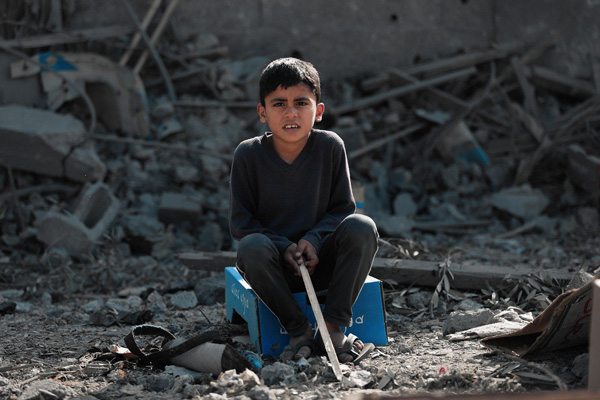Human Rights Watch accuses Israel of acts of genocide in Gaza over limited water supplies

[A boy in Gaza, Photo Credit to Pixabay]
Human Rights Watch (HRW) has issued a report accusing Israel of “acts of genocide” against Palestinians in Gaza through the systematic deprivation of water supplies, according to findings released December 19th.
The report, which covers the period between October 2023 and September 2024, indicates that the Israeli authorities have provided Palestinians with less than the World Health Organization (WHO)’s minimum water requirements for survival during prolonged emergency situations.
According to WHO guidelines, a person requires between 50 and 100 liters of water per day in order to meet their “most basic needs”
During emergency situations, this minimum requirement can be reduced to 15 liters per person daily for drinking and washing purposes.
However, the Israeli authorities are alleged to have deprived more than 2 million Palestianians living in Gaza of access to even this minimal amount, resulting in widespread death and disease.
Based on these actions, HRW maintains that Israel’s conduct constitutes genocide under the Genocide Convention and the Rome Statute of the International Criminal Court (ICC).
HRW executive director Tirana Hassan emphasized the gravity of the situation, asserting, “This isn't just negligence.”
Hassan further characterized the crisis as “nothing short of the crime against humanity of extermination” and “an act of genocide.”
The severity of water deprivation has contributed to multiple deaths among Palestinians, particularly affecting newborn babies whose mothers, suffering from malnourishment and dehydration, are forced to prepare formula with contaminated water.
Mohammed Hamouda, a health worker displaced in Deir al-Balah, reported that his family suffered from diarrhea and abdominal cramps due to continuous consumption of dirty water.
The crisis has also created severe sanitation issues.
In one improvised shelter, only 25 toilets are available for 14,000 people inside and 59,000 outside, leading to unhygienic conditions.
Women have been forced to endure multiple menstrual cycles without proper sanitation, while Muslim residents cannot find sufficient water for religious ablutions before prayer.
This current crisis follows years of water-related challenges in Gaza.
For instance, in 2017, the UN’s children agency, UNICEF stated that 95% of water from Gaza’s sole aquifer was unfit for human consumption due to factors such as over-extraction, seawater infiltration and sewage contamination.
The Palestinian Water Authority’s 2021 data showed that approximately 90% of Gaza’s water was sourced from groundwater wells, with the remaining 10% coming from desalination plants or Israel’s national water company, Mekorot.
Environmental conflict investigator, Wim Zwinnenburg of the Dutch peace organization PAX told CNN that the level of damage done to Gaza’s water systems is the “most severe we’ve seen so far in any conflict in the last 10 years, probably even longer.”
Nonetheless, Israeli foreign ministry spokesman Oren Marmorstein rejected HRW’s allegations via X, claiming that there is a “continuous flow of water and humanitarian aid into Gaza.”
He further added that water infrastructure remains operational and water tankers can deliver supplies through Israeli crossings.
Still, relief and humanitarian workers have previously reported that Israeli officials repeatedly rejected critical aid, including water purification tablets and filtration systems.
The situation has become increasingly dire with water prices rising from $7 to between $45 and $50 per 1,000 liters, exacerbating concerns about proper hydration and cooling.
In light of these conflicting statements, the water crisis in Gaza shows no signs of improvement, with essential resources becoming increasingly scarce for the region’s citizens.

- Jooha Roh / Grade 10
- Korea International School

![THE HERALD STUDENT REPORTERS [US]](/assets/images/logo_student_us.png)
![THE HERALD STUDENT REPORTERS [Canada]](/assets/images/logo_student_ca.png)
